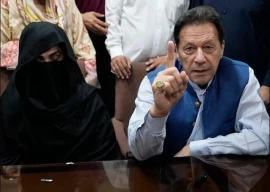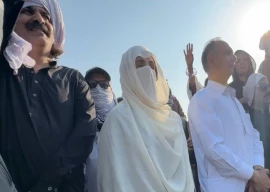When the Babri Mosque in Ayodhya was demolished in December 1992, for Prof. Ram Puniyani it was not only a sacred edifice that had crumbled before him, but a part of secular, democratic India as well. The incident galvanised him into making an effort to work towards cohesion among religious groups.
Since that fateful day, the human rights activist has written nine books on communal violence and received a number of awards for his work, including the Indira Gandhi National Integration Award 2006. Prof. Puniyani is currently in Pakistan to share his experiences and discuss how the rights of minorities can be protected.
On Friday, he delivered a lecture at the Area Study Centre for Europe at Karachi University in which he attempted to highlight the lessons that can be gleaned from the secularisation of Europe. Prof. Puniyani started off by lamenting the fact that secularism is often confused with ‘atheism’. “Secularism does not oppose religion, it opposes the clergy, who claim monopoly over knowledge and hence power,” he said. It is this power which allows the elite to suppress and take advantage of vulnerable groups. “Hundreds of ‘god-men’ in India earn million of rupees and could give the country’s big industrialists like Tata and Birla a run for their money. Look at Baba Ramdev – the spiritual leader earns a lot just by wearing saffron clothes.”
He added that the main difference between the secularisation of Europe and South Asia is that in the former, the rise of secularism was concomitant with the decline of a feudal order and was natural. In the latter, feudal politics were not done away with as secularism started to emerge and this was not an organic process, but was induced by the colonial powers. “We can’t cry over spilt milk. We can’t bring back the guillotine to get rid of the feudal lords either. We have a problem and we have to find a solution around it.”
When asked how he propagates the message of secularism among the youth of India, he told The Express Tribune that he mainly uses interactive workshops which aim to shatter erroneous stereotypes. Apart from this, he conducts video lectures in which films on minorities are screened. “And then of course the youth can refer to my extensive writing on communal violence. In my books, I have attempted to siphon reality from pervasive myths,” Prof. Puniyani added.
He feels that a large chunk of the Indian youth is quite receptive to the rhetoric on secularism. “You just have to know how to approach them properly,” said Prof. Punyani. “The only problem is that my reach is quite limited in comparison to that of the right-wing groups. They have been able to channel the energy of the youth into activities that are detrimental to India.”
When asked about the degree of opposition to his work, Prof. Puniyani told The Express Tribune that he has his fair share of detractors. “Certain right-wing groups are aware of my activities and have projected me as the enemy on their websites. Though I have not been threatened, I have received derogatory e-mails,” he said. “Sometimes I even receive postcards which have hateful messages scribbled on them.”
Prof. Puniyani also stressed peace between the two historically belligerent neighbours was the key to the eradication of communalism because sentiments often spill across state borders. “When a Hindu girl in Pakistan is forced to convert, I am castigated heavily for my efforts to improve the lives of the Muslim minority in India. Likewise, when Muslims are harmed in India, many Hindu worship sites come under attack.”
He acknowledged that the situation in India was at least better than that in Pakistan, where political leaders used religion to whitewash state rule with legitimacy and quell ethno-national movements. Though he could not offer a plan of action to combat sectarian and ethnic violence in Pakistan, he did say that “some people in this country are very pessimistic. But the important thing is to keep trying to push for pluralism.”
Published in The Express Tribune, July 7th, 2012.
COMMENTS (9)
Comments are moderated and generally will be posted if they are on-topic and not abusive.
For more information, please see our Comments FAQ




1732626034-0/BeFunky-collage-(92)1732626034-0-165x106.webp)




1732621030-0/Express-Tribune-(7)1732621030-0-270x192.webp)
1732622842-0/Express-Tribune-(9)1732622842-0-270x192.webp)






It's true that, although we call ourselves an Islamic country, we do not follow much of the religion itself in our daily lives. Islam requires us to be kind, not only with fellow Muslims, but all of Allah's creation. That's exactly what we ignore, especially the second part, and what's worse, we ignore it in the name of Islam. Many in our society have little Adolf Hitlers living inside them who condone mistreatment of minorities, which isn't strange since many of us also have a soft spot for Hitler for what he did to the Jews. Is it a surprise that the religious minorities are at a disadvantage in our country? The Quran provides us with an ideal way to live our lives, and all we need to do is open the Book and follow it. HOWEVER, to say that we do not need to listen to 'some scholar' just because we have the Quran is nonsense. All he's giving us is good advice, and good advice should be taken into consideration, whichever direction it has come from. Lastly, secularism DOES NOT mean that religion should be thrown out of our lives, but that power should not be based on religion. The idea of secularism sprouted in Europe after the Roman Catholic clergy had become increasingly corrupt, using the high status afforded to them. Secularism only requires that all people are treated equally, regardless of their religion. That is EXACTLY what Islam tells us, that there should be equal treatment whether a person is a ruler or a peasant, or a Muslim or a non-Muslim. I think secularism and Islam can very much go hand-in-hand.
@khoya pakistani:
You are really lost (khoya). Why don't you read and interpret the Quran and Ahadees yourselves? I am sure you are capable of doing this. I tell you it would be a lot easier than swallowing this Professor's lecture.
Best of luck Professor because you have an almost impossible task ahead. In Pakistan the two words that are completely misunderstood and badly abused are secularism and democracy. If headway is to be made a narrative hat delivers has to be inducted without the use of these two words.
@Mj: Yes. Your concern is valid. But the fact of the matter is that the masses do not follow the prescribed guidelines laid down by Islam. There is nothing wrong and can not be wrong with the guidance itself.
the only reason minorities are not attacked as they were in the past in india is not because of any new found love (all the past pogroms were politically motivated) but because of the 24-hour news channels and because the we do not have separate electorates - no party can hope to come to power in delhi having antagonised a minority atleast in the recent past -
@Moise: The word of God is interpreted by clergy, that is how they come in. They tend to have the last say in what you believe, case in point your belief in secularism as the work of the devil. It only reduces the power of the mullah, so he tells you its bad, ergo you believe whatever he wants you to.
@Hairaan: And how well is that working so far with different sects baying for each others blood?
Secularism is the principle of separation between government institutions and the persons mandated to represent the State from religious institutions and religious dignitaries.
Basically what they mean throw out religion from daily lives, hand over Sovereignty to elected humans instead of Allah. Not sure where this clergy thing comes from?
Who needs to listen to sermon from these scholars on religious matters when, we, Muslims have very clear guidance by Allah and his last Messenger (PBUH).